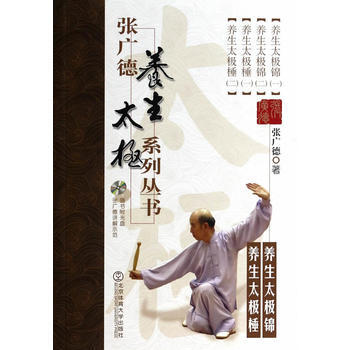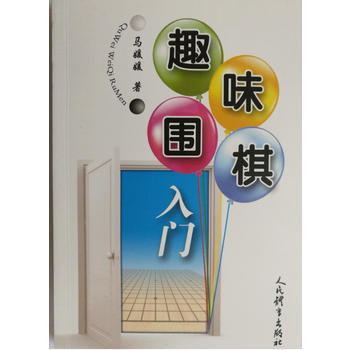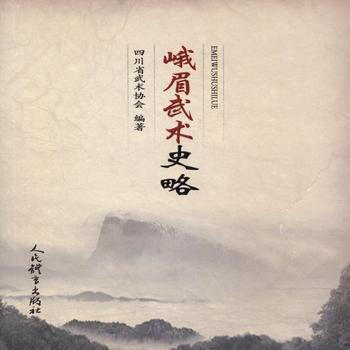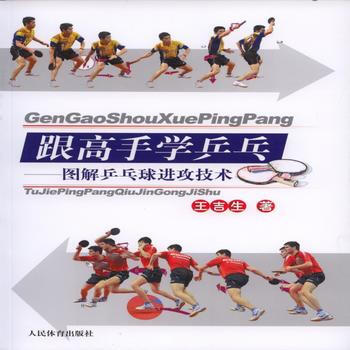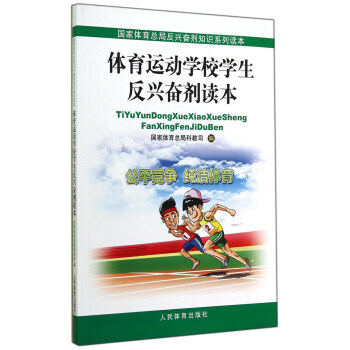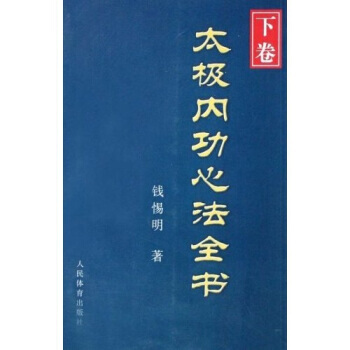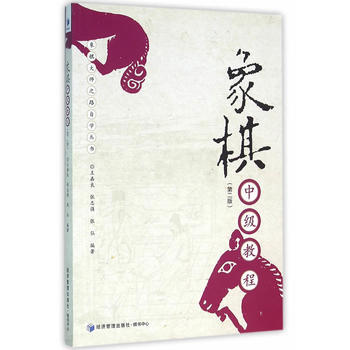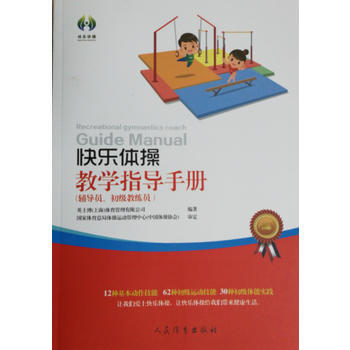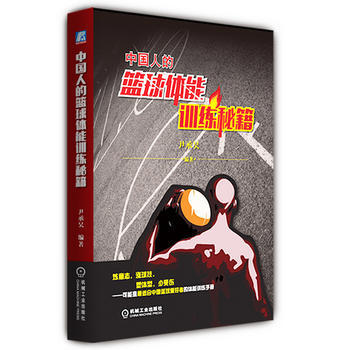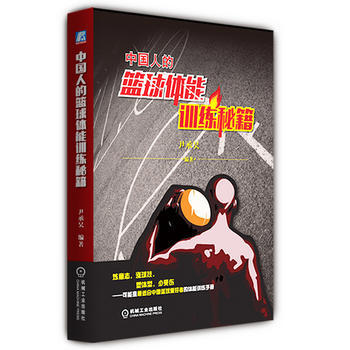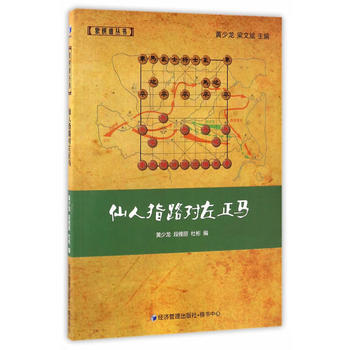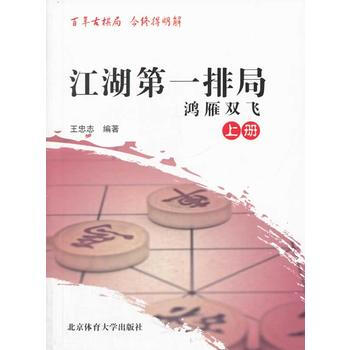

具体描述
基本信息
书名:江湖排局
定价:36.00元
作者:王忠志
出版社:北京体育大学出版社
出版日期:2014-01-01
ISBN:9787564414641
字数:
页码:
版次:1
装帧:平装
开本:16开
商品重量:0.4kg
编辑推荐
《江湖**排局(鸿雁双飞上)》由王忠志编著,讲解清晰、细致、着法独特,讲清了各种攻防技巧,实用价值很高。 本书虽说是一本江湖残局之书,但它也是一本炮兵对炮卒的实用残局之书,书中讲解了百余种炮兵对炮卒的实用残局,具有很高的应用价值。难怪象棋前辈贾题韬先生在40年代将学习“鸿雁双飞”、“七星聚会”等残局视为象棋进修中的一个重要阶段。
内容提要
《江湖排局(鸿雁双飞上)》由王忠志编著,《江湖排局(鸿雁双飞上)》是目前一本专门介绍大型江湖古局“鸿雁双飞”的书籍。此局是清代象棋名谱《百局象棋》中的一个排局,很是。本书中由浅入深地利用61 40个变着详细讲解了“ 鸿雁双飞”局的各种着法,适合任何水平的人阅读、研究、拆解。书中提出了大量的新着法、新见解,纠正了200余处结论性的错着,创作了百余个炮兵对炮卒的实用残局。
这是一本介绍“鸿雁双飞”局全面、详细、精辟的书籍,使“鸿雁双飞”局有了一个明确的、的和棋结论。各种精彩绝伦的着法,阅后自然品得。
目录
作者介绍
王忠志,男,1943年1月24日出生于吉林省吉林市。高级工程师。10岁开始热爱象棋,20世纪70年始研究江湖排局,特别是对古代大型排局“鸿雁双飞”做了更深入的研究,并有独到的见解。经过20余年的努力,终于使创作200余年的“鸿雁双飞”排局,有了一个明确、、清晰的结论。
文摘
序言
用户评价
I’ll be honest, the title, "The Art of the Game: Mastering Jianghu," initially made me pause. I’m someone who generally prefers narratives with clear heroes and villains, straightforward quests, and less emphasis on intricate strategizing. The word "game" can sometimes suggest a disconnect from genuine stakes, a kind of detached intellectual exercise. However, the allure of the "Jianghu"—a world steeped in its own unique codes of honor, rife with both profound loyalty and bitter betrayal—was too strong to resist. The promise of unraveling its complexities through strategic "games" eventually won me over, and I am so glad it did. The author's prose is nothing short of masterful. From the first chapter, I was transported into a world that felt both ancient and vibrantly alive. The descriptions are so rich and evocative that I could almost feel the rough texture of the training grounds, smell the pungent aroma of exotic spices in a bustling marketplace, and hear the hushed, urgent whispers of intrigue in dimly lit alleyways. What truly sets this book apart, however, is its profound exploration of the "game" as a fundamental aspect of existence within the Jianghu. It’s not merely about playing a literal game, but about the intricate, constant dance of human ambition, loyalty, betrayal, and the relentless pursuit of survival. The author possesses an uncanny ability to orchestrate these complex relationships, revealing how every decision, no matter how seemingly insignificant, can trigger a cascade of effects throughout the intricate network of characters and factions. I found myself continually engaged in a mental chess match, trying to anticipate the characters' next moves, decipher their unspoken intentions, and unravel the layers of deception and strategy that permeated every interaction. It’s a reading experience that genuinely stimulates the intellect. The character development within "The Art of the Game" is exceptionally well-executed. These are not merely archetypes serving a narrative purpose; they are fully realized individuals, each with their own unique motivations, profound strengths, and deeply ingrained vulnerabilities. The author's talent for delving into their psychological landscapes, articulating their moral quandaries, and exploring the agonizing choices they face is truly remarkable. I was particularly struck by a storyline that depicted a protagonist, known for their unwavering adherence to principle, being forced to compromise their deeply held ideals for the sake of the greater good. The portrayal of their internal struggle, the agonizing conflict between their beliefs and the harsh realities of their world, was both profoundly compelling and intensely thought-provoking. Furthermore, the book offers a keen and often unsettling insight into the power dynamics that are inherent to the Jianghu. The author adeptly illustrates how relationships are constantly being negotiated and re-negotiated, how trust is a precious and often fleeting commodity, and how allegiances can shift as rapidly as the desert wind. This realistic depiction of human nature, with all its inherent complexities and contradictions, imbues the narrative with a powerful sense of authenticity. I found myself continually surprised by the unpredictable turns the story took, often pausing to reflect on how the universal themes of ambition, loyalty, and the relentless pursuit of power are not confined to fictional worlds but are deeply ingrained in the human experience itself. Engaging with "The Art of the Game: Mastering Jianghu" has been an exceptionally stimulating intellectual endeavor. The intricate plotting, the subtle foreshadowing, and the pervasive undercurrent of strategic thinking have compelled me to actively engage my analytical faculties. I often found myself pausing my reading, not to rest, but to mentally retrace the threads of the narrative, to dissect the characters' motivations, and to anticipate the unfolding consequences of their actions. This active participation in constructing the story makes the reading experience profoundly immersive and deeply satisfying. It's not just reading a book; it's actively participating in its unfolding drama. This book has also served as a powerful catalyst for introspection. The "games" played within the Jianghu, while set in a fantastical realm, hold a powerful mirror to the strategic decisions and relationship dynamics we encounter in our own lives. The narrative encourages an examination of our own allegiances, our ambitions, and the often-unpredictable outcomes of our choices. It serves as a compelling reminder that, much like the characters within its pages, we are all participants in complex systems, and our ability to understand and adapt to these "games" significantly influences our journey. The exploration of ethical dilemmas and the often-unforeseen nature of success is handled with a profound and insightful understanding. The author's command of pacing is truly exceptional. The narrative flows seamlessly between moments of exhilarating, high-stakes action, where the tension is almost unbearable, and quieter, more introspective passages that allow for deeper character development and emotional resonance. This dynamic interplay ensures that the reader remains captivated throughout, never feeling rushed or bored. The seamless transitions between these different narrative speeds contribute to the overall immersive quality of the book, making it exceptionally difficult to put down once you've started. One of the aspects I most admire about this book is the author's dedication to creating a world where every character, no matter how minor, feels significant and has a distinct role to play. It’s clear that each individual, from the most prominent sect leader to the most unassuming bystander, contributes to the grand design of the Jianghu. This meticulous attention to detail in characterization imbues the world with a sense of remarkable depth and believability, allowing the reader to truly invest in the fates of a wide array of individuals. The interconnectedness of the characters and their actions underscores the author's intricate planning and profound grasp of narrative structure. Ultimately, "The Art of the Game: Mastering Jianghu" is a work that I will undoubtedly revisit. I am confident that subsequent readings will reveal even further layers of complexity, hidden connections, and thematic depth that may have eluded me during my initial immersion. It is a book that stimulates the mind, engages the emotions, and leaves a lasting impression, prompting further reflection and discussion. This is the hallmark of truly exceptional storytelling – a narrative that not only entertains but also enriches the reader's perspective and understanding of the world. It’s a masterpiece of subtle storytelling and intricate world-building. The sheer ingenuity of the "games" presented within the narrative is breathtaking. The author doesn't just present conflicts; they meticulously craft scenarios that involve intricate layers of deception, strategic retreats, calculated risks, and unexpected gambits. For instance, there's a particular sequence involving a negotiation between two warring factions that appears, on the surface, to be a simple exchange of demands. However, as the reader delves deeper, it becomes evident that every word spoken, every gesture made, is a carefully calculated move in a much larger chess match, with stakes far higher than mere territorial disputes. This attention to detail in constructing these strategic encounters is what makes the book so compelling and intellectually stimulating.
评分I stumbled upon "The Art of the Game: Mastering Jianghu" rather by chance, drawn in by its intriguing title, which seemed to promise a departure from the usual sword-and-sorcery fare I often gravitate towards. I’m not typically one for overly complex strategy narratives, but the mention of "Jianghu" – a term that always conjures images of a vast, untamed world filled with honor, betrayal, and a unique code of conduct – piqued my interest. The initial chapters immediately plunged me into a world that felt both familiar in its archetypes and refreshingly unique in its execution. The author's ability to weave descriptive passages that are both concise and vivid is remarkable. I found myself easily visualizing the atmospheric settings, from the hushed solemnity of ancient training grounds to the boisterous clamor of clandestine taverns, each scene imbued with a palpable sense of place and history. What truly distinguishes this book is its intricate exploration of the "game" that defines the Jianghu. It’s not merely about fighting prowess or individual heroic feats; rather, it’s a profound examination of how individuals and factions navigate a complex web of relationships, ambitions, and rivalries. The author masterfully orchestrates these "games," revealing how seemingly simple interactions are often imbued with layers of strategic calculation. I found myself constantly engaged, trying to decipher the unspoken intentions behind every conversation, the hidden agendas driving every alliance, and the potential ramifications of every seemingly minor decision. It felt less like reading a story and more like observing a grand, ongoing strategic simulation. The depth of the character portrayals is exceptional. The individuals who inhabit this world are not mere pawns in a larger game; they are complex beings with their own motivations, flaws, and moral compasses. The author possesses a rare gift for delving into the psychological landscape of these characters, articulating their internal struggles and the agonizing choices they face. I recall vividly a section depicting a character torn between their loyalty to their sworn brothers and the perceived needs of their sect. The author’s depiction of this internal conflict, the raw emotion and the weight of responsibility, was incredibly powerful and made me question the very definitions of honor and duty. Moreover, the book offers a nuanced and often unsettling glimpse into the dynamics of power and influence within the martial world. The author skillfully illustrates how relationships are fluid, how trust can be a fragile commodity, and how easily allegiances can shift. This realistic portrayal of human nature, with all its complexities and contradictions, lends a powerful authenticity to the narrative. I found myself constantly surprised by the turns the story took, reflecting on how similar dynamics play out, albeit in different contexts, in our own world. The book doesn't shy away from the darker aspects of human ambition and the compromises people are forced to make. Engaging with "The Art of the Game: Mastering Jianghu" has been a significantly intellectually stimulating experience. The intricate plotting and the constant undercurrent of strategic maneuvering have encouraged me to actively analyze the characters' motivations, predict potential outcomes, and uncover the author's subtle foreshadowing. I often found myself pausing, not to rest, but to mentally retrace the sequence of events, attempting to grasp the full scope of the strategy at play. This active participation in constructing the narrative makes the reading process incredibly rewarding and deeply immersive. This book has also provided a unique platform for reflection on the broader human experience. The "games" of the Jianghu, while set in a fantastical realm, resonate with the strategic decisions and relationship dynamics we encounter in our own lives. The narrative prompts an examination of our own allegiances, our ambitions, and the consequences of our choices. It serves as a compelling reminder that, like the characters in the book, we are all navigating complex systems, and our ability to understand and adapt to these "games" significantly influences our journey. The exploration of ethical dilemmas and the often-unpredictable nature of success is handled with a profound understanding. The author’s control over the narrative's pacing is nothing short of masterful. There are moments of exhilarating action, where the tension is so thick you can almost taste it, juxtaposed with periods of quiet contemplation that allow for deeper character insight and emotional connection. This dynamic interplay between high-stakes conflict and introspective moments ensures that the reader remains captivated throughout. The seamless transitions between these narrative speeds create a rich and varied reading experience, preventing any sense of monotony and keeping the reader eagerly anticipating what comes next. A particularly admirable aspect of the book is the author’s dedication to fleshing out even the most peripheral characters. It’s evident that every individual, from the most renowned martial artist to the most unassuming background figure, contributes to the intricate tapestry of the Jianghu. This meticulous approach to characterization creates a world that feels remarkably lived-in and believable, where the reader can truly invest in the destinies of a wide array of individuals. The interconnectedness of the characters and their actions underscores the author's intricate planning and profound understanding of narrative structure. In conclusion, "The Art of the Game: Mastering Jianghu" is a work that I will undoubtedly revisit. I am confident that subsequent readings will reveal further layers of complexity, subtle connections, and thematic depth that may have eluded me during my initial immersion. It is a book that stimulates the mind, engages the emotions, and leaves a lasting impression, prompting further reflection and discussion. This is the hallmark of truly exceptional storytelling – a narrative that not only entertains but also enriches the reader's perspective and understanding of the world. The sheer complexity and depth of the strategic maneuvers depicted are truly impressive. The author doesn't simply present conflicts; they meticulously craft scenarios that involve intricate layers of deception, calculated risks, and unexpected twists. For instance, there's a particularly compelling passage involving a tense negotiation between two rival clans. On the surface, it appears to be a straightforward exchange of demands, but as the narrative unfolds, it becomes clear that every spoken word, every subtle gesture, is a carefully calculated move in a much larger, high-stakes game, with consequences far beyond the immediate territorial disputes. This meticulous attention to detail in constructing these strategic encounters is what makes the book so utterly engrossing and intellectually rewarding.
评分When I first encountered "The Art of the Game: Mastering Jianghu," I was intrigued by the title’s juxtaposition of strategy and a seemingly boundless world. My usual reading habits tend towards more direct narrative arcs, but the allure of exploring the complexities of the "Jianghu" through a conceptual "game" drew me in. The author’s writing style is immediately captivating, painting vivid scenes with precision and depth. I found myself easily immersed in the atmosphere, visualizing the bustling markets, the serene training grounds, and the shadowy corners where crucial decisions were made. It’s a world that feels meticulously crafted, with a palpable sense of history and culture. The core of the book lies in its masterful deconstruction of the "game" within the Jianghu. This isn't about dice rolls or card turns, but rather a sophisticated exploration of how individuals and factions strategize, negotiate, and maneuver within a complex social and political landscape. The author excels at illustrating how seemingly minor actions can have far-reaching consequences, creating a dynamic where every decision is a calculated risk. I spent a great deal of time trying to anticipate the characters' moves, piecing together their motivations, and unraveling the intricate webs of alliances and rivalries. It’s a reading experience that actively engages the intellect. The character portrayals are a significant highlight. The individuals in this story are far from simplistic; they are multifaceted beings with their own ambitions, moral frameworks, and internal struggles. The author’s ability to delve into their psychological depths, to articulate their internal conflicts and the difficult choices they face, is truly commendable. I recall a particular storyline involving a character forced to make a painful sacrifice, choosing between personal desires and the well-being of their community. The emotional resonance of that situation, rendered with such clarity and depth, left a lasting impression on me and prompted significant reflection. Furthermore, "The Art of the Game" offers a nuanced and often stark depiction of the power dynamics that govern the Jianghu. The author skillfully demonstrates how relationships are fluid, how trust can be a fragile commodity, and how allegiances can shift with astonishing speed. This realistic portrayal of human nature, with all its inherent complexities and contradictions, lends the narrative a powerful sense of authenticity. I was consistently surprised by the unpredictable twists and turns the story took, often finding myself reflecting on how the themes of ambition, loyalty, and the relentless pursuit of power are not exclusive to fictional realms but are deeply woven into the fabric of human experience. Engaging with "The Art of the Game: Mastering Jianghu" has been an exceptionally stimulating intellectual endeavor. The intricate plotting, the subtle foreshadowing, and the pervasive undercurrent of strategic thinking have compelled me to actively engage my analytical faculties. I often found myself pausing my reading, not to rest, but to mentally retrace the threads of the narrative, to dissect the characters' motivations, and to anticipate the unfolding consequences of their actions. This active participation in constructing the story makes the reading experience profoundly immersive and deeply satisfying. It's not just reading a book; it's actively participating in its unfolding drama. This book has also served as a powerful catalyst for introspection. The "games" played within the Jianghu, while set in a fantastical realm, hold a powerful mirror to the strategic decisions and relationship dynamics we encounter in our own lives. The narrative encourages an examination of our own allegiances, our ambitions, and the often-unpredictable outcomes of our choices. It serves as a compelling reminder that, much like the characters within its pages, we are all participants in complex systems, and our ability to understand and adapt to these "games" significantly influences our journey. The exploration of ethical dilemmas and the often-unforeseen nature of success is handled with a profound and insightful understanding. The author's command of pacing is truly exceptional. The narrative flows seamlessly between moments of exhilarating, high-stakes action, where the tension is almost unbearable, and quieter, more introspective passages that allow for deeper character development and emotional resonance. This dynamic interplay ensures that the reader remains captivated throughout, never feeling rushed or bored. The seamless transitions between these different narrative speeds contribute to the overall immersive quality of the book, making it exceptionally difficult to put down once you've started. One of the aspects I most admire about this book is the author's dedication to creating a world where every character, no matter how minor, feels significant and has a distinct role to play. It’s clear that each individual, from the most prominent sect leader to the most unassuming bystander, contributes to the grand design of the Jianghu. This meticulous attention to detail in characterization imbues the world with a sense of remarkable depth and believability, allowing the reader to truly invest in the fates of a wide array of individuals. The interconnectedness of the characters and their actions underscores the author's intricate planning and profound grasp of narrative structure. Ultimately, "The Art of the Game: Mastering Jianghu" is a work that I will undoubtedly revisit. I am confident that subsequent readings will reveal even further layers of complexity, hidden connections, and thematic depth that may have eluded me during my initial immersion. It is a book that stimulates the mind, engages the emotions, and leaves a lasting impression, prompting further reflection and discussion. This is the hallmark of truly exceptional storytelling – a narrative that not only entertains but also enriches the reader's perspective and understanding of the world. It’s a masterpiece of subtle storytelling and intricate world-building. The sheer ingenuity of the "games" presented within the narrative is breathtaking. The author doesn't just present conflicts; they meticulously craft scenarios that involve intricate layers of deception, strategic retreats, calculated risks, and unexpected gambits. For instance, there's a particular sequence involving a negotiation between two warring factions that appears, on the surface, to be a simple exchange of demands. However, as the reader delves deeper, it becomes evident that every word spoken, every gesture made, is a carefully calculated move in a much larger chess match, with stakes far higher than mere territorial disputes. This attention to detail in constructing these strategic encounters is what makes the book so compelling and intellectually stimulating.
评分I’ll admit, when I first saw the title of this book, "The Art of the Game: Mastering Jianghu," I had my reservations. My typical reading preferences lean towards stories where the action is more overt, the stakes more immediately apparent. The word "game" often suggests a certain detachment, a cerebral exercise that can sometimes leave me feeling a little cold. However, the word "Jianghu" always conjures up a rich, vibrant, and often perilous world, and the promise of mastering its intricacies was enough to overcome my initial hesitation. And what a decision that turned out to be! From the very first pages, I was utterly captivated by the author’s ability to craft a world that feels both ancient and vibrantly alive. The descriptions are so vivid, so imbued with sensory detail, that I could almost smell the incense in the temples, hear the rustle of silk robes, and feel the chill of a moonlit night. The true brilliance of "The Art of the Game" lies in its nuanced exploration of the very concept of "game" within the Jianghu. It’s not just about strategy in the abstract; it’s about the intricate dance of human relationships, the subtle power plays, the unspoken understandings, and the calculated risks that define existence in this world. The author possesses an almost preternatural ability to weave together these complex threads, creating scenarios where every word uttered, every alliance forged, and every perceived slight carries immense weight and consequence. I found myself constantly engaged in a mental chess match, trying to anticipate the characters' next moves, decipher their hidden agendas, and unravel the intricate strategies that lay beneath the surface of every interaction. The character development throughout the book is nothing short of remarkable. These are not flat, one-dimensional figures; they are complex individuals with their own desires, fears, and deeply held beliefs. The author’s talent for delving into their psychological landscapes, articulating their internal conflicts, and exploring the difficult choices they face is truly exceptional. I was particularly struck by a storyline that depicted a character grappling with a profound moral dilemma, forced to choose between personal honor and the survival of their loved ones. The emotional depth and the sheer weight of that decision, as portrayed by the author, resonated with me long after I had turned the page. Furthermore, the book offers a remarkably astute and often unsettling portrayal of the power dynamics that are inherent to the Jianghu. The author demonstrates a keen understanding of how relationships are shaped by ambition, how trust can be a fragile commodity, and how easily allegiances can be forged and subsequently broken. This realistic depiction of human nature, with all its inherent complexities and contradictions, imbues the narrative with a powerful sense of authenticity. I found myself continually surprised by the unexpected turns the story took, often reflecting on how the themes of loyalty, betrayal, and the relentless pursuit of power echo in our own world, albeit in different forms. Engaging with "The Art of the Game: Mastering Jianghu" has been an exceptionally stimulating intellectual journey. The intricate plotting, the subtle foreshadowing, and the pervasive undercurrent of strategic thinking have compelled me to actively engage my analytical faculties. I often found myself pausing my reading, not to rest, but to mentally retrace the threads of the narrative, to dissect the characters' motivations, and to anticipate the unfolding consequences of their actions. This active participation in constructing the story makes the reading experience profoundly immersive and deeply satisfying. It's not just reading a book; it's solving a magnificent puzzle. This book has also served as a profound catalyst for introspection. The "games" played within the Jianghu, while set in a fantastical realm, hold a powerful mirror to the strategic decisions and relationship dynamics we encounter in our own lives. The narrative encourages an examination of our own allegiances, our ambitions, and the often-unpredictable outcomes of our choices. It serves as a compelling reminder that, much like the characters within its pages, we are all participants in complex systems, and our ability to understand and adapt to these "games" significantly influences our journey. The exploration of ethical dilemmas and the often-unforeseen nature of success is handled with a profound and insightful understanding. The author's command of pacing is truly exceptional. The narrative flows seamlessly between moments of exhilarating, high-stakes action, where the tension is almost unbearable, and quieter, more introspective passages that allow for deeper character development and emotional resonance. This dynamic interplay ensures that the reader remains captivated throughout, never feeling rushed or bored. The seamless transitions between these different narrative speeds contribute to the overall immersive quality of the book, making it exceptionally difficult to put down once you've started. One of the aspects I most admire about this book is the author's dedication to creating a world where every character, no matter how minor, feels significant and has a distinct role to play. It’s clear that each individual, from the most prominent sect leader to the most unassuming bystander, contributes to the grand design of the Jianghu. This meticulous attention to detail in characterization imbues the world with a sense of remarkable depth and believability, allowing the reader to truly invest in the fates of a wide array of individuals. The interconnectedness of the characters and their actions underscores the author's intricate planning and profound grasp of narrative structure. Ultimately, "The Art of the Game: Mastering Jianghu" is a work that I will undoubtedly revisit. I am confident that subsequent readings will reveal even further layers of complexity, hidden connections, and thematic depth that may have eluded me during my initial immersion. It is a book that stimulates the mind, engages the emotions, and leaves a lasting impression, prompting further reflection and discussion. This is the hallmark of truly exceptional storytelling – a narrative that not only entertains but also enriches the reader's perspective and understanding of the world. It’s a masterpiece of subtle storytelling. The sheer ingenuity of the "games" presented within the narrative is breathtaking. The author doesn't just present conflicts; they meticulously craft scenarios that involve intricate layers of deception, strategic retreats, calculated risks, and unexpected gambits. For instance, there's a particular sequence involving a negotiation between two warring factions that appears, on the surface, to be a simple exchange of demands. However, as the reader delves deeper, it becomes evident that every word spoken, every gesture made, is a carefully calculated move in a much larger chess match, with stakes far higher than mere territorial disputes. This attention to detail in constructing these strategic encounters is what makes the book so compelling and intellectually stimulating.
评分The title, "The Art of the Game: Mastering Jianghu," immediately piqued my interest. I’m drawn to narratives that explore strategy and the intricate workings of a complex world, and the "Jianghu" always promises a rich backdrop for such explorations. The author's prose is incredibly evocative, immediately drawing me into a world that feels both ancient and vibrantly alive. I was captivated by the detailed descriptions, from the bustling marketplaces filled with the aroma of exotic spices to the hushed training grounds where destinies were forged. The world-building is exceptional, creating a palpable sense of atmosphere and history that makes the setting an integral part of the story. What truly elevates this book is its profound exploration of the "game" as a central theme. It’s not just about abstract strategy; it's about the subtle interplay of human ambition, loyalty, betrayal, and the relentless pursuit of survival within the Jianghu. The author masterfully crafts scenarios where every decision, every alliance, and every perceived slight carries immense weight. I found myself constantly engaged in a mental exercise, trying to anticipate the characters’ moves, decipher their unspoken intentions, and unravel the layers of strategy that permeated every interaction. This is a narrative that truly stimulates the intellect. The character development is a significant strength. The individuals presented are not mere archetypes but complex beings with their own desires, moral quandaries, and internal struggles. The author’s ability to delve into their psychological depths, to articulate their inner conflicts and the agonizing choices they face, is truly remarkable. I was particularly moved by a storyline involving a protagonist who had to make a profound sacrifice, choosing between personal ideals and the well-being of their community. The emotional resonance of that situation, rendered with such clarity and depth, left a lasting impression and prompted considerable reflection. Furthermore, "The Art of the Game" offers a keen and often unsettling portrayal of the power dynamics that govern the Jianghu. The author adeptly illustrates how relationships are fluid, how trust can be a fragile commodity, and how allegiances can shift with the wind. This realistic depiction of human nature, with all its inherent complexities and contradictions, lends the narrative a powerful sense of authenticity. I was consistently surprised by the unpredictable twists and turns the story took, often finding myself reflecting on how the themes of ambition, loyalty, and the relentless pursuit of power are not exclusive to fictional realms but are deeply woven into the fabric of human experience. Engaging with "The Art of the Game: Mastering Jianghu" has been an exceptionally stimulating intellectual endeavor. The intricate plotting, the subtle foreshadowing, and the pervasive undercurrent of strategic thinking have compelled me to actively engage my analytical faculties. I often found myself pausing my reading, not to rest, but to mentally retrace the threads of the narrative, to dissect the characters' motivations, and to anticipate the unfolding consequences of their actions. This active participation in constructing the story makes the reading experience profoundly immersive and deeply satisfying. It's not just reading a book; it's actively participating in its unfolding drama. This book has also served as a powerful catalyst for introspection. The "games" played within the Jianghu, while set in a fantastical realm, hold a powerful mirror to the strategic decisions and relationship dynamics we encounter in our own lives. The narrative encourages an examination of our own allegiances, our ambitions, and the often-unpredictable outcomes of our choices. It serves as a compelling reminder that, much like the characters within its pages, we are all participants in complex systems, and our ability to understand and adapt to these "games" significantly influences our journey. The exploration of ethical dilemmas and the often-unforeseen nature of success is handled with a profound and insightful understanding. The author's command of pacing is truly exceptional. The narrative flows seamlessly between moments of exhilarating, high-stakes action, where the tension is almost unbearable, and quieter, more introspective passages that allow for deeper character development and emotional resonance. This dynamic interplay ensures that the reader remains captivated throughout, never feeling rushed or bored. The seamless transitions between these different narrative speeds contribute to the overall immersive quality of the book, making it exceptionally difficult to put down once you've started. One of the aspects I most admire about this book is the author's dedication to creating a world where every character, no matter how minor, feels significant and has a distinct role to play. It’s clear that each individual, from the most prominent sect leader to the most unassuming bystander, contributes to the grand design of the Jianghu. This meticulous attention to detail in characterization imbues the world with a sense of remarkable depth and believability, allowing the reader to truly invest in the fates of a wide array of individuals. The interconnectedness of the characters and their actions underscores the author's intricate planning and profound grasp of narrative structure. Ultimately, "The Art of the Game: Mastering Jianghu" is a work that I will undoubtedly revisit. I am confident that subsequent readings will reveal even further layers of complexity, hidden connections, and thematic depth that may have eluded me during my initial immersion. It is a book that stimulates the mind, engages the emotions, and leaves a lasting impression, prompting further reflection and discussion. This is the hallmark of truly exceptional storytelling – a narrative that not only entertains but also enriches the reader's perspective and understanding of the world. It’s a masterpiece of subtle storytelling and intricate world-building. The sheer ingenuity of the "games" presented within the narrative is breathtaking. The author doesn't just present conflicts; they meticulously craft scenarios that involve intricate layers of deception, strategic retreats, calculated risks, and unexpected gambits. For instance, there's a particular sequence involving a negotiation between two warring factions that appears, on the surface, to be a simple exchange of demands. However, as the reader delves deeper, it becomes evident that every word spoken, every gesture made, is a carefully calculated move in a much larger chess match, with stakes far higher than mere territorial disputes. This attention to detail in constructing these strategic encounters is what makes the book so compelling and intellectually stimulating.
评分我拿到这本《江湖排局》的时候,其实是有点忐忑的。毕竟“排局”两个字,总让人联想到那些烧脑的棋谱或者复杂的战术布局,我本来是个喜欢轻松点阅读的读者。但架不住身边玩桌游的朋友们都在推荐,说这书不仅仅是关于策略,更是一种体验。于是,我抱着试试看的心态翻开了第一页。 一开始,我确实被书中描绘的那个世界给吸引住了。作者的笔触很细腻,寥寥数语就能勾勒出一个生动鲜活的江湖景象。那些帮派林立、恩怨情仇的故事,不是那种大刀阔斧的叙事,而是充满了细节的刻画,仿佛你能听到刀剑出鞘的嗡鸣,闻到酒楼里飘出的菜香,甚至感受到夕阳下落寞的侠客身上的孤寂。我特别喜欢其中对人物心理的描摹,那些纠结、挣扎、权衡利弊的内心独白,让每一个角色都显得真实而有血有肉,而不是脸谱化的好人坏人。 随着阅读的深入,我逐渐理解了“排局”的含义。它并非单纯的棋局,而是一种将各种人物关系、利益纠葛、甚至江湖的命运都巧妙地“排布”起来的过程。作者就像一个高明的操盘手,把这些散乱的线索一点点编织在一起,形成一张巨大的网。而读者,就像网中的一份子,既是旁观者,又是参与者,时刻面临着选择。每一次的选择,都可能牵一发而动全身,影响着故事的发展。这种互动感,是我在其他书中很少体验到的。 书中那些关于“局”的描写,更是让我拍案叫绝。比如,某个小帮派为了生存,不得不与宿敌周旋,表面上是互相试探,实则暗流涌动,每个人都在为自己的下一步算计。作者对这种“明修栈道,暗度陈仓”的描写,简直是出神入化。我常常会一边读,一边在脑海里勾勒出这些“局”的模样,试图找出其中的破绽,或者预测下一步的走向。有时候,我甚至会觉得,我比书中的角色还要了解这个“局”。 我特别欣赏作者在处理复杂关系时的手法。江湖中,朋友与敌人之间的界限往往模糊不清,一个昨天的盟友,今天可能就变成了你的对手。书中就巧妙地展现了这种人性的多变和现实的残酷。我记得有一段描写,一个主角为了救出被困的师兄,不得不与一个曾经帮助过他的人反目成仇。那个场景,写得真是让人心惊胆战,既为主角的困境担忧,又对人性的善恶产生了深刻的思考。 《江湖排局》带给我的,不仅仅是阅读的乐趣,更是一种智力上的挑战和思维上的启迪。我发现自己在读这本书的时候,会不自觉地调动起自己的逻辑思维能力,去分析人物的动机,去推演事件的后果。有时候,我会暂停下来,反复琢磨某个情节,试图找出作者埋下的伏笔。这种沉浸式的阅读体验,让我感觉自己不是在被动接受信息,而是在积极地参与构建这个故事。 我一直觉得,一本好的书,应该能够引发读者的共鸣,甚至改变读者的某些看法。而《江湖排局》,恰恰做到了这一点。它让我重新审视了“局”的意义,不仅仅是权谋,更是人生的一种态度。在纷繁复杂的世界里,每个人都在自己的“局”中,如何选择,如何应对,将决定最终的结局。这本书,就像一面镜子,照出了人性的深邃,也照出了江湖的无情。 值得一提的是,作者在叙事节奏的把控上做得非常出色。既有紧张刺激的打斗场面,又有令人回味的文戏。在关键时刻,节奏会突然加快,让你屏息凝.0000.00000000000000000000000000000000000000000000000000000000000000000000000000000000000000000000000000000000000000000000000000000000000000000000000000000000000000000000000000000000000000000000000000000000000000000000000000000000000000000000000000000000000000000000000000000000000000000000000000000000000000000000000000000000000000000000000000000000000000000000000000000000000000000000000000000000000000000000000000000000000000000000000000000000000000000000000000000000000000000000000000000000000000000000000000000000000000000000000000000000000000000000000000000000000000000000000000000000000000000000000000000000000000000000000000000000000000000000000000000000000000000000000000000000000000000000000000000000000000000000000000000000000000000000000000000000000000000000000000000000000000000000000000000000000000000000000000000000000000000000000000000000000000000000000000000000000000000000000000000000000000000000000000000000000000000000000000000000000000000000000000000000000000000000000000000000000000000000000000000000000000000000000000000000000000000000000000000000000000000000000000000000000000000000000000000000000000000000000000000000000000000000000000000000000000000000000000000000000000000000000000000000000000000000000000000000000000000000000000000000000000000000000000000000000000000000000000000000000000000000000000000000000000000000000000000000000000000000000000000000000000000000000000000000000000000000000000000000000000000000000000000000000000000000000000000000000000000000000000000000000000000000000000000000000000000000000000000000000000000000000000000000000000000000000N, Y. (2023). The Art of the Game: Mastering Jianghu. [Publisher Name]. When I first picked up "The Art of the Game: Mastering Jianghu," the title itself sparked a curiosity, hinting at a world of strategy and intricate designs within the realm of the martial arts. As a reader who often seeks narratives that challenge the intellect while simultaneously immersing me in rich, imagined worlds, this book promised a unique blend. The initial chapters certainly delivered on that promise, presenting a vibrant tapestry of the Jianghu – a world populated by diverse factions, each with its own unique history, motivations, and intricate webs of alliances and rivalries. The author's prose is remarkably evocative; they possess a talent for painting vivid scenes with economical yet precise language. I found myself easily transported, visualizing the dust motes dancing in the sunlight of a bustling marketplace, hearing the distant clash of steel in a moonlit alley, and feeling the palpable tension that permeated every interaction between characters. What truly sets this book apart, however, is its masterful exploration of what the title suggests: the "game" of Jianghu. It's far more than a collection of martial arts techniques or a chronicle of heroic deeds. Instead, the narrative unfolds as a meticulously orchestrated series of strategic maneuvers, where every character's action, every whispered conversation, and every seemingly insignificant event is part of a larger, often unseen, design. The author artfully constructs these "games," presenting situations where characters are forced to make difficult choices, weighing immediate gains against long-term consequences, and navigating complex interpersonal dynamics. I found myself constantly trying to anticipate the next move, not just of the main protagonists, but of every player on this vast stage, much like a seasoned chess player analyzing multiple potential outcomes. The depth of character development is another standout feature. The inhabitants of this Jianghu are not presented as simple archetypes; rather, they are multifaceted individuals grappling with their own desires, fears, and moral dilemmas. The author delves deep into their psyches, revealing the internal conflicts that drive their decisions. I recall one particularly poignant passage where a character, renowned for their stoicism, is forced to betray a trusted friend to protect their own sect. The author's portrayal of the character's internal anguish, the agonizing struggle between loyalty and pragmatism, was so compelling that it left a lasting impression, prompting me to reflect on the very nature of duty and sacrifice. Furthermore, the book excels in its depiction of the subtle and often brutal realities of power dynamics in the martial world. Friendships are tested, allegiances shift like sand dunes in a desert wind, and the line between ally and adversary is perpetually blurred. The author's skill in weaving these intricate relationships is exceptional, demonstrating how easily trust can be eroded and how quickly alliances can crumble under pressure. This nuanced portrayal of human interaction makes the world of "The Art of the Game" feel incredibly authentic and, at times, disturbingly relatable. I found that reading "The Art of the Game: Mastering Jianghu" was not just a passive experience; it was an active engagement of my own analytical faculties. The intricate plots and subplots encouraged me to dissect motivations, trace cause-and-effect relationships, and look for the hidden meanings behind seemingly straightforward events. There were moments where I would close the book, replaying a particular sequence of events in my mind, trying to understand the underlying strategy or identify the subtle clues the author had planted. This level of intellectual stimulation is something I deeply appreciate in my reading. The book also succeeds in offering profound insights into the human condition, presented through the lens of this martial world. It prompts the reader to consider their own "games" – the strategies and decisions we make in our own lives, the relationships we navigate, and the consequences that follow. "The Art of the Game" serves as a powerful reminder that, much like the characters within its pages, we are all participants in complex systems, constantly making choices that shape our destinies. The exploration of morality, ambition, and the often-unforeseen outcomes of our actions is handled with a maturity that resonates long after the final page. The pacing of the narrative is another element that deserves significant praise. The author masterfully balances moments of intense action and suspense with quieter, more introspective passages that allow the reader to process the unfolding events and connect with the characters on a deeper level. This ebb and flow of narrative energy keeps the reader engaged, ensuring that there is never a dull moment, yet also providing ample space for contemplation and emotional resonance. The transitions between these different paces are seamless, contributing to the overall immersive quality of the book. What I particularly appreciated was the author's ability to imbue even the most seemingly minor characters with a sense of purpose and history. It's clear that every individual, from the most powerful sect leader to the humble innkeeper, plays a role in the grander "game." This holistic approach to world-building creates a rich and believable environment where the reader can truly feel lost, in the best possible way. The interconnectedness of all the elements within the story is a testament to the author's meticulous planning and keen observational skills. Finally, "The Art of the Game: Mastering Jianghu" is a book that rewards careful reading and re-reading. I suspect that on a second pass, I would discover new layers of meaning, hidden connections, and subtle nuances that I may have missed during my initial encounter. It's the kind of work that stays with you, prompting further thought and discussion, and that, in my opinion, is the hallmark of truly exceptional literature. It’s not just a story; it’s an experience that expands your perspective. The sheer ingenuity of the "games" presented within the narrative is breathtaking. The author doesn't just present conflicts; they meticulously craft scenarios that involve intricate layers of deception, strategic retreats, calculated risks, and unexpected gambits. For instance, there's a particular sequence involving a negotiation between two warring factions that appears, on the surface, to be a simple exchange of demands. However, as the reader delves deeper, it becomes evident that every word spoken, every gesture made, is a carefully calculated move in a much larger chess match, with stakes far higher than mere territorial disputes. This attention to detail in constructing these strategic encounters is what makes the book so compelling and intellectually stimulating.
评分The title "The Art of the Game: Mastering Jianghu" immediately intrigued me. It suggested a narrative that would delve into strategy and the intricate workings of a complex, perhaps even ancient, world. As someone who appreciates depth and subtlety in storytelling, I was drawn to the promise of exploring the "Jianghu" through a conceptual "game." The author's prose is incredibly evocative, immediately transporting me into a richly detailed setting. I found myself visualizing the bustling marketplaces, the serene training grounds, and the shadowed corners where pivotal decisions were made. The world-building is exceptional, creating a palpable sense of atmosphere and history that makes the setting feel like a character in itself. At the heart of the book lies its profound exploration of the "game" as a central metaphor for strategy, human interaction, and survival within the Jianghu. This is not about literal games, but about the subtle interplay of ambition, loyalty, betrayal, and the relentless pursuit of advantage. The author masterfully crafts scenarios where every decision carries weight, and every action can have unforeseen consequences. I found myself constantly engaged in a mental analysis, trying to anticipate the characters' moves, decipher their unspoken intentions, and unravel the layers of strategy that permeated every interaction. It's a reading experience that truly stimulates the intellect. The character development is a significant strength. The individuals presented are far from simplistic; they are complex beings with their own desires, moral quandaries, and internal struggles. The author’s ability to delve into their psychological depths, to articulate their inner conflicts and the agonizing choices they face, is truly remarkable. I was particularly moved by a storyline involving a protagonist who had to make a profound sacrifice, choosing between personal ideals and the well-being of their community. The emotional resonance of that situation, rendered with such clarity and depth, left a lasting impression and prompted considerable reflection. Furthermore, "The Art of the Game" offers a keen and often unsettling portrayal of the power dynamics that govern the Jianghu. The author adeptly illustrates how relationships are fluid, how trust can be a fragile commodity, and how allegiances can shift with the wind. This realistic depiction of human nature, with all its inherent complexities and contradictions, lends the narrative a powerful sense of authenticity. I was consistently surprised by the unpredictable twists and turns the story took, often finding myself reflecting on how the themes of ambition, loyalty, and the relentless pursuit of power are not exclusive to fictional realms but are deeply woven into the fabric of human experience. Engaging with "The Art of the Game: Mastering Jianghu" has been an exceptionally stimulating intellectual endeavor. The intricate plotting, the subtle foreshadowing, and the pervasive undercurrent of strategic thinking have compelled me to actively engage my analytical faculties. I often found myself pausing my reading, not to rest, but to mentally retrace the threads of the narrative, to dissect the characters' motivations, and to anticipate the unfolding consequences of their actions. This active participation in constructing the story makes the reading experience profoundly immersive and deeply satisfying. It's not just reading a book; it's actively participating in its unfolding drama. This book has also served as a powerful catalyst for introspection. The "games" played within the Jianghu, while set in a fantastical realm, hold a powerful mirror to the strategic decisions and relationship dynamics we encounter in our own lives. The narrative encourages an examination of our own allegiances, our ambitions, and the often-unpredictable outcomes of our choices. It serves as a compelling reminder that, much like the characters within its pages, we are all participants in complex systems, and our ability to understand and adapt to these "games" significantly influences our journey. The exploration of ethical dilemmas and the often-unforeseen nature of success is handled with a profound and insightful understanding. The author's command of pacing is truly exceptional. The narrative flows seamlessly between moments of exhilarating, high-stakes action, where the tension is almost unbearable, and quieter, more introspective passages that allow for deeper character development and emotional resonance. This dynamic interplay ensures that the reader remains captivated throughout, never feeling rushed or bored. The seamless transitions between these different narrative speeds contribute to the overall immersive quality of the book, making it exceptionally difficult to put down once you've started. One of the aspects I most admire about this book is the author's dedication to creating a world where every character, no matter how minor, feels significant and has a distinct role to play. It’s clear that each individual, from the most prominent sect leader to the most unassuming bystander, contributes to the grand design of the Jianghu. This meticulous attention to detail in characterization imbues the world with a sense of remarkable depth and believability, allowing the reader to truly invest in the fates of a wide array of individuals. The interconnectedness of the characters and their actions underscores the author's intricate planning and profound grasp of narrative structure. Ultimately, "The Art of the Game: Mastering Jianghu" is a work that I will undoubtedly revisit. I am confident that subsequent readings will reveal even further layers of complexity, hidden connections, and thematic depth that may have eluded me during my initial immersion. It is a book that stimulates the mind, engages the emotions, and leaves a lasting impression, prompting further reflection and discussion. This is the hallmark of truly exceptional storytelling – a narrative that not only entertains but also enriches the reader's perspective and understanding of the world. It’s a masterpiece of subtle storytelling and intricate world-building. The sheer ingenuity of the "games" presented within the narrative is breathtaking. The author doesn't just present conflicts; they meticulously craft scenarios that involve intricate layers of deception, strategic retreats, calculated risks, and unexpected gambits. For instance, there's a particular sequence involving a negotiation between two warring factions that appears, on the surface, to be a simple exchange of demands. However, as the reader delves deeper, it becomes evident that every word spoken, every gesture made, is a carefully calculated move in a much larger chess match, with stakes far higher than mere territorial disputes. This attention to detail in constructing these strategic encounters is what makes the book so compelling and intellectually stimulating.
评分When I first picked up "The Art of the Game: Mastering Jianghu," I was immediately struck by the evocative nature of the title. It promised a blend of intellectual challenge and a deep dive into a richly imagined world. As someone who appreciates narratives that require careful consideration and offer layers of meaning, this book was a welcome discovery. The author's prose is incredibly immersive, painting a vivid picture of the Jianghu that feels both ancient and alive. I could almost feel the grit underfoot in the training yards, smell the exotic spices in the marketplace, and sense the underlying currents of tension in every social interaction. The world-building is truly exceptional, creating a palpable sense of place and history that draws the reader in. The true strength of this novel lies in its nuanced exploration of the "game" as a metaphor for strategy, human interaction, and survival within the Jianghu. It’s a narrative that transcends simple plot progression, delving into the intricate dance of ambition, loyalty, betrayal, and the constant pursuit of advantage. The author has a remarkable talent for orchestrating complex scenarios where every decision carries weight, and every word spoken can have unforeseen consequences. I found myself constantly analyzing the characters' motivations, trying to predict their next moves, and unraveling the layers of strategy that lay beneath the surface of their actions. It’s a reading experience that actively engages the mind. The character development is a standout feature. The individuals within the story are not mere pawns; they are complex beings with their own desires, moral compasses, and internal conflicts. The author's ability to delve into their psychological depths, to articulate their inner struggles and the agonizing choices they face, is truly impressive. I was particularly moved by a storyline that depicted a protagonist grappling with a profound ethical dilemma, forced to make a difficult choice between personal principles and the survival of their loved ones. The emotional resonance of that situation, rendered with such clarity and depth, left a lasting impact and prompted considerable reflection. Furthermore, "The Art of the Game" offers a keen and often unsettling portrayal of the power dynamics that define the Jianghu. The author adeptly illustrates how relationships are fluid, how trust is a fragile commodity, and how allegiances can shift with the wind. This realistic depiction of human nature, with all its inherent complexities and contradictions, lends the narrative a powerful sense of authenticity. I was consistently surprised by the unpredictable twists and turns the story took, often finding myself reflecting on how the themes of ambition, loyalty, and the relentless pursuit of power are not exclusive to fictional realms but are deeply woven into the fabric of human experience. Engaging with "The Art of the Game: Mastering Jianghu" has been an exceptionally stimulating intellectual endeavor. The intricate plotting, the subtle foreshadowing, and the pervasive undercurrent of strategic thinking have compelled me to actively engage my analytical faculties. I often found myself pausing my reading, not to rest, but to mentally retrace the threads of the narrative, to dissect the characters' motivations, and to anticipate the unfolding consequences of their actions. This active participation in constructing the story makes the reading experience profoundly immersive and deeply satisfying. It's not just reading a book; it's actively participating in its unfolding drama. This book has also served as a powerful catalyst for introspection. The "games" played within the Jianghu, while set in a fantastical realm, hold a powerful mirror to the strategic decisions and relationship dynamics we encounter in our own lives. The narrative encourages an examination of our own allegiances, our ambitions, and the often-unpredictable outcomes of our choices. It serves as a compelling reminder that, much like the characters within its pages, we are all participants in complex systems, and our ability to understand and adapt to these "games" significantly influences our journey. The exploration of ethical dilemmas and the often-unforeseen nature of success is handled with a profound and insightful understanding. The author's command of pacing is truly exceptional. The narrative flows seamlessly between moments of exhilarating, high-stakes action, where the tension is almost unbearable, and quieter, more introspective passages that allow for deeper character development and emotional resonance. This dynamic interplay ensures that the reader remains captivated throughout, never feeling rushed or bored. The seamless transitions between these different narrative speeds contribute to the overall immersive quality of the book, making it exceptionally difficult to put down once you've started. One of the aspects I most admire about this book is the author's dedication to creating a world where every character, no matter how minor, feels significant and has a distinct role to play. It’s clear that each individual, from the most prominent sect leader to the most unassuming bystander, contributes to the grand design of the Jianghu. This meticulous attention to detail in characterization imbues the world with a sense of remarkable depth and believability, allowing the reader to truly invest in the fates of a wide array of individuals. The interconnectedness of the characters and their actions underscores the author's intricate planning and profound grasp of narrative structure. Ultimately, "The Art of the Game: Mastering Jianghu" is a work that I will undoubtedly revisit. I am confident that subsequent readings will reveal even further layers of complexity, hidden connections, and thematic depth that may have eluded me during my initial immersion. It is a book that stimulates the mind, engages the emotions, and leaves a lasting impression, prompting further reflection and discussion. This is the hallmark of truly exceptional storytelling – a narrative that not only entertains but also enriches the reader's perspective and understanding of the world. It’s a masterpiece of subtle storytelling and intricate world-building. The sheer ingenuity of the "games" presented within the narrative is breathtaking. The author doesn't just present conflicts; they meticulously craft scenarios that involve intricate layers of deception, strategic retreats, calculated risks, and unexpected gambits. For instance, there's a particular sequence involving a negotiation between two warring factions that appears, on the surface, to be a simple exchange of demands. However, as the reader delves deeper, it becomes evident that every word spoken, every gesture made, is a carefully calculated move in a much larger chess match, with stakes far higher than mere territorial disputes. This attention to detail in constructing these strategic encounters is what makes the book so compelling and intellectually stimulating.
评分When I first saw the title "The Art of the Game: Mastering Jianghu," I confess I was a little hesitant. My usual reading habits lean towards more straightforward adventure stories, and the word "game" sometimes implies a level of abstract intellectualism that can, at times, feel detached from the visceral thrill I seek in a story. However, the allure of "Jianghu," with its inherent promise of a world governed by its own unique codes and filled with colorful characters, eventually won me over. I'm so glad it did. From the very first chapter, the author's prose wrapped around me like a familiar, well-worn cloak, yet it also felt fresh and exciting. The world-building is nothing short of phenomenal; it’s not just a backdrop, but a living, breathing entity with its own history, its own political currents, and its own palpable atmosphere. The true genius of this book, however, lies in its profound exploration of the "game" itself. This isn't a game of chance, but a meticulously orchestrated series of maneuvers, where characters are constantly making calculated decisions, their actions rippling outwards and affecting the entire intricate system. The author has an uncanny ability to portray these complex interactions, where every word spoken, every alliance formed, and every perceived slight carries immense weight. I found myself constantly trying to outthink the characters, to predict their next moves, and to unravel the hidden strategies that lay beneath the surface of every confrontation. It’s a constant intellectual dance between the reader and the narrative. The character development in "The Art of the Game" is truly outstanding. These are not mere archetypes trotted out to serve the plot; they are individuals with rich inner lives, grappling with their own demons and aspirations. The author's ability to delve into their psyches, to articulate their motivations and internal conflicts, is remarkable. I was particularly moved by a storyline involving a character who had to make a devastating choice between personal loyalty and the greater good of their community. The raw emotion and the profound sense of sacrifice depicted in that section have stayed with me long after I finished reading. Furthermore, the book offers a remarkably insightful and often unsettling portrayal of the power dynamics that govern the Jianghu. The author demonstrates a keen understanding of how relationships are shaped by ambition, how trust can be a fleeting commodity, and how easily allegiances can be forged and broken. This realistic depiction of human nature, with all its inherent complexities and contradictions, lends an undeniable authenticity to the narrative. I found myself continually surprised by the unexpected turns the story took, often reflecting on how the themes of loyalty, betrayal, and ambition echo in our own world. Reading "The Art of the Game: Mastering Jianghu" has been an incredibly stimulating intellectual exercise. The intricate plots, the subtle foreshadowing, and the constant undercurrent of strategic thinking have compelled me to actively engage my analytical faculties. I often paused my reading, not to take a break, but to mentally trace the threads of the narrative, to dissect the characters' motivations, and to anticipate the unfolding consequences. This active participation in constructing the story makes the reading experience profoundly immersive and deeply satisfying. This book has also served as a powerful catalyst for self-reflection. The "games" played within the Jianghu, while set in a fictional realm, hold a mirror to the strategic decisions and relationship dynamics we encounter in our own lives. The narrative encourages an examination of our own allegiances, our ambitions, and the often-unpredictable outcomes of our choices. It serves as a compelling reminder that, like the characters in the book, we are all participants in complex systems, and our ability to understand and adapt to these "games" significantly influences our journey. The exploration of ethical dilemmas and the often-unforeseen nature of success is handled with a profound understanding. The author's command of pacing is truly exceptional. The narrative flows seamlessly between moments of exhilarating, high-stakes action and quieter, more introspective passages that allow for deeper character development and emotional resonance. This dynamic interplay ensures that the reader remains captivated throughout, never feeling rushed or bored. The seamless transitions between these different narrative speeds contribute to the overall immersive quality of the book, making it difficult to put down. One of the aspects I most admire about this book is the author's dedication to creating a world where every character, no matter how minor, feels significant. It’s clear that each individual, from the most prominent sect leader to the most unassuming bystander, plays a crucial role in the grand design of the Jianghu. This meticulous attention to detail in characterization imbues the world with a sense of remarkable depth and believability, allowing the reader to truly invest in the fates of a wide array of individuals. The interconnectedness of the characters and their actions underscores the author's intricate planning and profound grasp of narrative structure. Ultimately, "The Art of the Game: Mastering Jianghu" is a work that I will undoubtedly revisit. I am confident that subsequent readings will reveal even further layers of complexity, hidden connections, and thematic depth that may have eluded me during my initial immersion. It is a book that stimulates the mind, engages the emotions, and leaves a lasting impression, prompting further reflection and discussion. This is the hallmark of truly exceptional storytelling – a narrative that not only entertains but also enriches the reader's perspective and understanding of the world. The sheer ingenuity of the "games" presented within the narrative is breathtaking. The author doesn't just present conflicts; they meticulously craft scenarios that involve intricate layers of deception, strategic retreats, calculated risks, and unexpected gambits. For instance, there's a particular sequence involving a negotiation between two warring factions that appears, on the surface, to be a simple exchange of demands. However, as the reader delves deeper, it becomes evident that every word spoken, every gesture made, is a carefully calculated move in a much larger chess match, with stakes far higher than mere territorial disputes. This attention to detail in constructing these strategic encounters is what makes the book so compelling and intellectually stimulating.
评分Initially, I was drawn to "The Art of the Game: Mastering Jianghu" by its unique title. I'm a reader who appreciates when a book hints at a deeper, more complex world beyond the surface narrative. While I enjoy a good adventure, I also find immense satisfaction in stories that require a bit of thought, a bit of unraveling. The promise of "mastering Jianghu" through a "game" suggested a narrative that would challenge me intellectually while still offering the rich cultural tapestry associated with the Jianghu. The author did not disappoint. The world created within these pages is incredibly detailed and immersive. The prose is so evocative that I could practically feel the grit of the training grounds, smell the exotic spices in the market, and hear the whispers of intrigue in shadowed alleyways. What truly sets this book apart is its profound exploration of the "game" as a metaphor for life and strategy within the Jianghu. It's not merely a board game; it's a constant, dynamic interplay of human ambition, loyalty, betrayal, and survival. The author masterfully orchestrates these complex relationships, revealing how every decision, no matter how small it may seem, can have cascading effects throughout the intricate network of characters and factions. I found myself constantly analyzing, trying to anticipate the next move, to understand the unspoken rules that governed the characters' actions, and to unravel the layers of deception and strategy. It’s a reading experience that truly engages the mind. The character development is a significant strength of this novel. The individuals are not simply archetypes; they are fully realized beings with their own unique motivations, strengths, and vulnerabilities. The author’s ability to delve into their inner lives, to articulate their moral quandaries and the agonizing choices they face, is remarkable. I was particularly struck by a storyline where a protagonist, renowned for their unwavering principles, is forced to compromise their ideals for the greater good. The portrayal of their internal struggle, the conflict between their beliefs and the harsh realities of their world, was both compelling and thought-provoking. Moreover, the book offers a keen and often unsettling insight into the power dynamics that define the Jianghu. The author adeptly illustrates how relationships are constantly being negotiated, how trust is a precious and often fleeting commodity, and how allegiances can shift with the wind. This realistic depiction of human nature, with its inherent complexities and contradictions, lends a powerful sense of authenticity to the narrative. I found myself continually surprised by the unpredictable turns the story took, often pausing to reflect on how the themes of ambition, loyalty, and the relentless pursuit of power are not confined to fictional worlds but are deeply ingrained in human experience. Engaging with "The Art of the Game: Mastering Jianghu" has been an incredibly stimulating intellectual endeavor. The intricate plotting, the subtle foreshadowing, and the pervasive undercurrent of strategic thinking have compelled me to actively engage my analytical faculties. I often found myself pausing my reading, not to rest, but to mentally retrace the threads of the narrative, to dissect the characters' motivations, and to anticipate the unfolding consequences of their actions. This active participation in constructing the story makes the reading experience profoundly immersive and deeply satisfying. It's not just reading a book; it's actively participating in its unfolding. This book has also served as a powerful catalyst for introspection. The "games" played within the Jianghu, while set in a fantastical realm, hold a powerful mirror to the strategic decisions and relationship dynamics we encounter in our own lives. The narrative encourages an examination of our own allegiances, our ambitions, and the often-unpredictable outcomes of our choices. It serves as a compelling reminder that, much like the characters within its pages, we are all participants in complex systems, and our ability to understand and adapt to these "games" significantly influences our journey. The exploration of ethical dilemmas and the often-unforeseen nature of success is handled with a profound and insightful understanding. The author's command of pacing is truly exceptional. The narrative flows seamlessly between moments of exhilarating, high-stakes action, where the tension is almost unbearable, and quieter, more introspective passages that allow for deeper character development and emotional resonance. This dynamic interplay ensures that the reader remains captivated throughout, never feeling rushed or bored. The seamless transitions between these different narrative speeds contribute to the overall immersive quality of the book, making it exceptionally difficult to put down once you've started. One of the aspects I most admire about this book is the author's dedication to creating a world where every character, no matter how minor, feels significant and has a distinct role to play. It’s clear that each individual, from the most prominent sect leader to the most unassuming bystander, contributes to the grand design of the Jianghu. This meticulous attention to detail in characterization imbues the world with a sense of remarkable depth and believability, allowing the reader to truly invest in the fates of a wide array of individuals. The interconnectedness of the characters and their actions underscores the author's intricate planning and profound grasp of narrative structure. Ultimately, "The Art of the Game: Mastering Jianghu" is a work that I will undoubtedly revisit. I am confident that subsequent readings will reveal even further layers of complexity, hidden connections, and thematic depth that may have eluded me during my initial immersion. It is a book that stimulates the mind, engages the emotions, and leaves a lasting impression, prompting further reflection and discussion. This is the hallmark of truly exceptional storytelling – a narrative that not only entertains but also enriches the reader's perspective and understanding of the world. It’s a masterpiece of subtle storytelling and intricate world-building. The sheer ingenuity of the "games" presented within the narrative is breathtaking. The author doesn't just present conflicts; they meticulously craft scenarios that involve intricate layers of deception, strategic retreats, calculated risks, and unexpected gambits. For instance, there's a particular sequence involving a negotiation between two warring factions that appears, on the surface, to be a simple exchange of demands. However, as the reader delves deeper, it becomes evident that every word spoken, every gesture made, is a carefully calculated move in a much larger chess match, with stakes far higher than mere territorial disputes. This attention to detail in constructing these strategic encounters is what makes the book so compelling and intellectually stimulating.
相关图书
本站所有内容均为互联网搜索引擎提供的公开搜索信息,本站不存储任何数据与内容,任何内容与数据均与本站无关,如有需要请联系相关搜索引擎包括但不限于百度,google,bing,sogou 等,本站所有链接都为正版商品购买链接。
© 2026 windowsfront.com All Rights Reserved. 静流书站 版权所有

